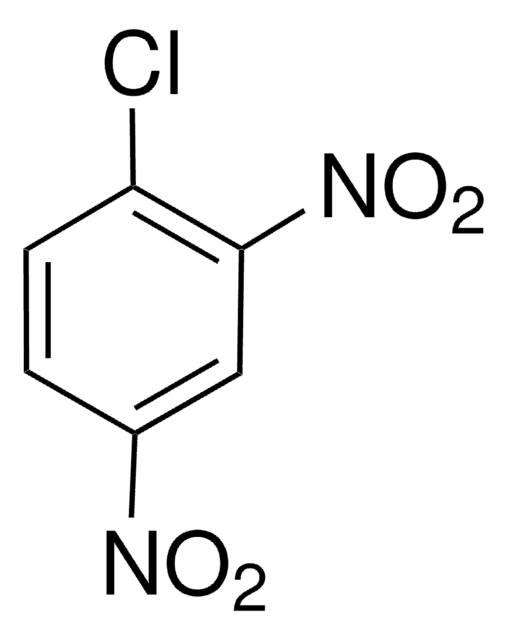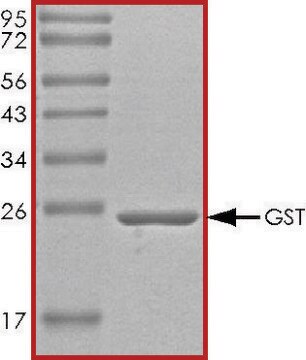GS70
GST P1-1, Recombinant Human
Sinonimo/i:
DFN7, FAEES3, GST3, GSTP, HEL-S-22, glutathione S-transferase pi
Autenticatiper visualizzare i prezzi riservati alla tua organizzazione & contrattuali
About This Item
Codice UNSPSC:
12352200
NACRES:
NA.26
Prodotti consigliati
Origine biologica
human
Livello qualitativo
Ricombinante
expressed in E. coli
Saggio
>95% (SDS-PAGE)
Stato
frozen liquid
Attività specifica
60.45 units/mg protein
PM
23 kDa
Temperatura di conservazione
−70°C
Informazioni sul gene
human ... GSTP1(2950)
Descrizione generale
using spectrophotometric determination of 1-chloro-2,4-dinitrobenzene (CDNB) conjugation with reduced glutathione (1.0 mM) in 100 mM KPO4 (pH 6.5) at room temperature.
Azioni biochim/fisiol
Glutathione S-transferase pi 1 (GSTP1) is an enzyme that in humans is encoded by the GSTP1 gene. Glutathione S-transferases (GSTs) are a family of enzymes that play an important role in detoxification by catalyzing the conjugation of many hydrophobic and electrophilic compounds with reduced glutathione. Based on their biochemical, immunologic, and structural properties, cytosolic and membrane-bound forms of glutathione S-transferase are encoded by two distinct supergene families. At present, eight distinct classes of the soluble cytoplasmic mammalian glutathione S-transferases have been identified: alpha, kappa, mu, omega, pi, sigma, theta and zeta. The GSTs are thought to function in xenobiotic metabolism and play a role in susceptibility to cancer, and other diseases.
This GST family member is a polymorphic gene encoding active, functionally different GSTP1 variant proteins that are thought to function in xenobiotic metabolism and play a role in susceptibility to cancer, and other diseases.
Stoccaggio e stabilità
The enzyme should be used by the end-user customer within 1 year of receipt.
Codice della classe di stoccaggio
10 - Combustible liquids
Classe di pericolosità dell'acqua (WGK)
WGK 1
Punto d’infiammabilità (°F)
Not applicable
Punto d’infiammabilità (°C)
Not applicable
Scegli una delle versioni più recenti:
Certificati d'analisi (COA)
Lot/Batch Number
Non trovi la versione di tuo interesse?
Se hai bisogno di una versione specifica, puoi cercare il certificato tramite il numero di lotto.
Possiedi già questo prodotto?
I documenti relativi ai prodotti acquistati recentemente sono disponibili nell’Archivio dei documenti.
I clienti hanno visto anche
J Haluskova et al.
Bratislavske lekarske listy, 116(2), 79-82 (2015-02-11)
Prostate cancer (PCa) represents one of the most complicated human tumors and, like many others malignancies, arises from progressive genetic and epigenetic alterations. Among all recognized epigenetic alterations, aberrant DNA methylation (hypo- and hypermethylation) is the most important and the
Mohamad Nidal Khabaz et al.
Asian Pacific journal of cancer prevention : APJCP, 16(5), 1707-1713 (2015-03-17)
Eighty six cases of invasive ductal breast carcinomas were utilized to investigate GSTP1 polymorphisms in certain immunohistochemistry (IHC) subtypes of breast cancer with respect to ER, PR and HER2 expression. The frequency of wild allele homozygote, heterozygote and variant allele
Q F Li et al.
Genetics and molecular research : GMR, 14(2), 6762-6772 (2015-07-01)
Epigenetic silencing of the GSTP1 gene by promoter methylation has been associated with increased risk and shortened survival in patients with hepatocellular carcinoma (HCC). We therefore conducted a meta-analysis to obtain a more precise estimate of this association. By searching
Cheng-Fan Zhou et al.
Archives of dermatological research, 307(6), 505-513 (2015-06-06)
Numerous epidemiological studies have evaluated the association of Glutathione S-transferase P1 (GSTP1) Ile105Val polymorphism with the risk of skin cancer. However, the results remain inconclusive. To derive a more precise estimation of the association between the GSTP1 Ile105Val polymorphism and
Junhua Wu et al.
PloS one, 10(6), e0128280-e0128280 (2015-06-06)
Brick tea type fluorosis is a public health concern in the north-west area of China. The association between SNPs of genes influencing bone mass and fluorosis has attracted attention, but the association of SNPs with the risk of brick-tea type
Il team dei nostri ricercatori vanta grande esperienza in tutte le aree della ricerca quali Life Science, scienza dei materiali, sintesi chimica, cromatografia, discipline analitiche, ecc..
Contatta l'Assistenza Tecnica.








